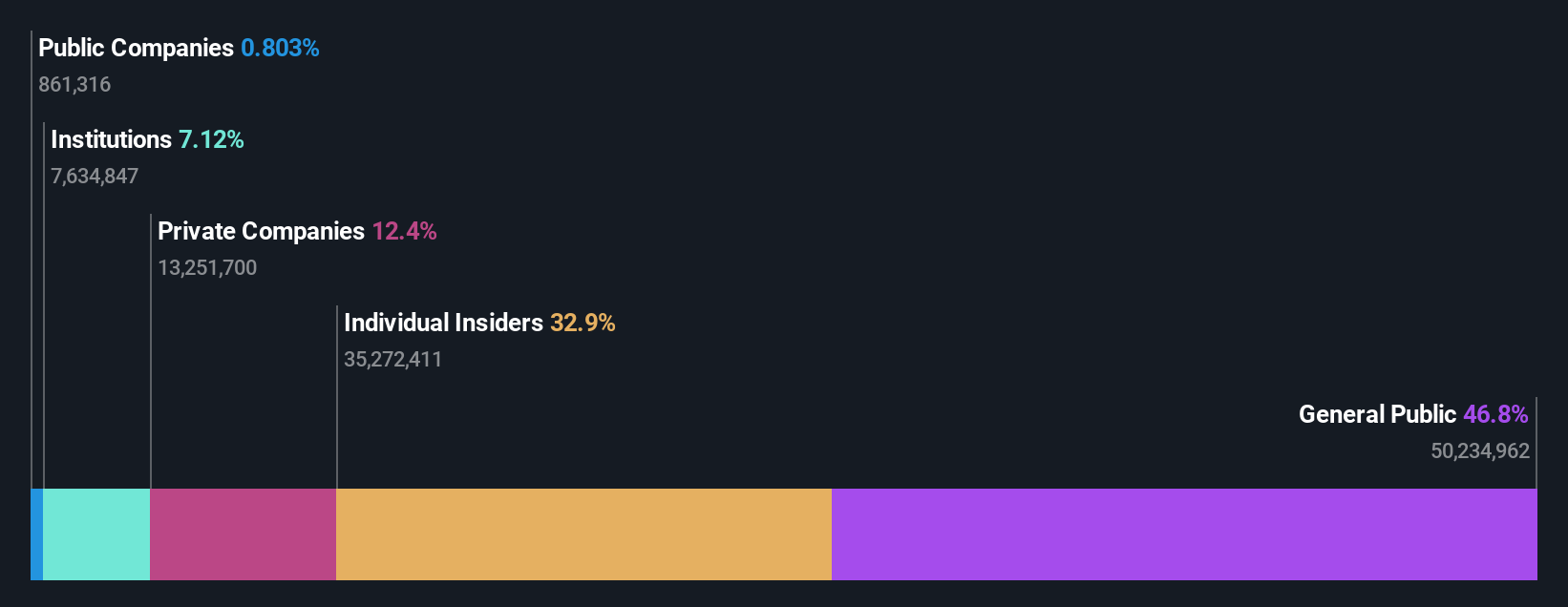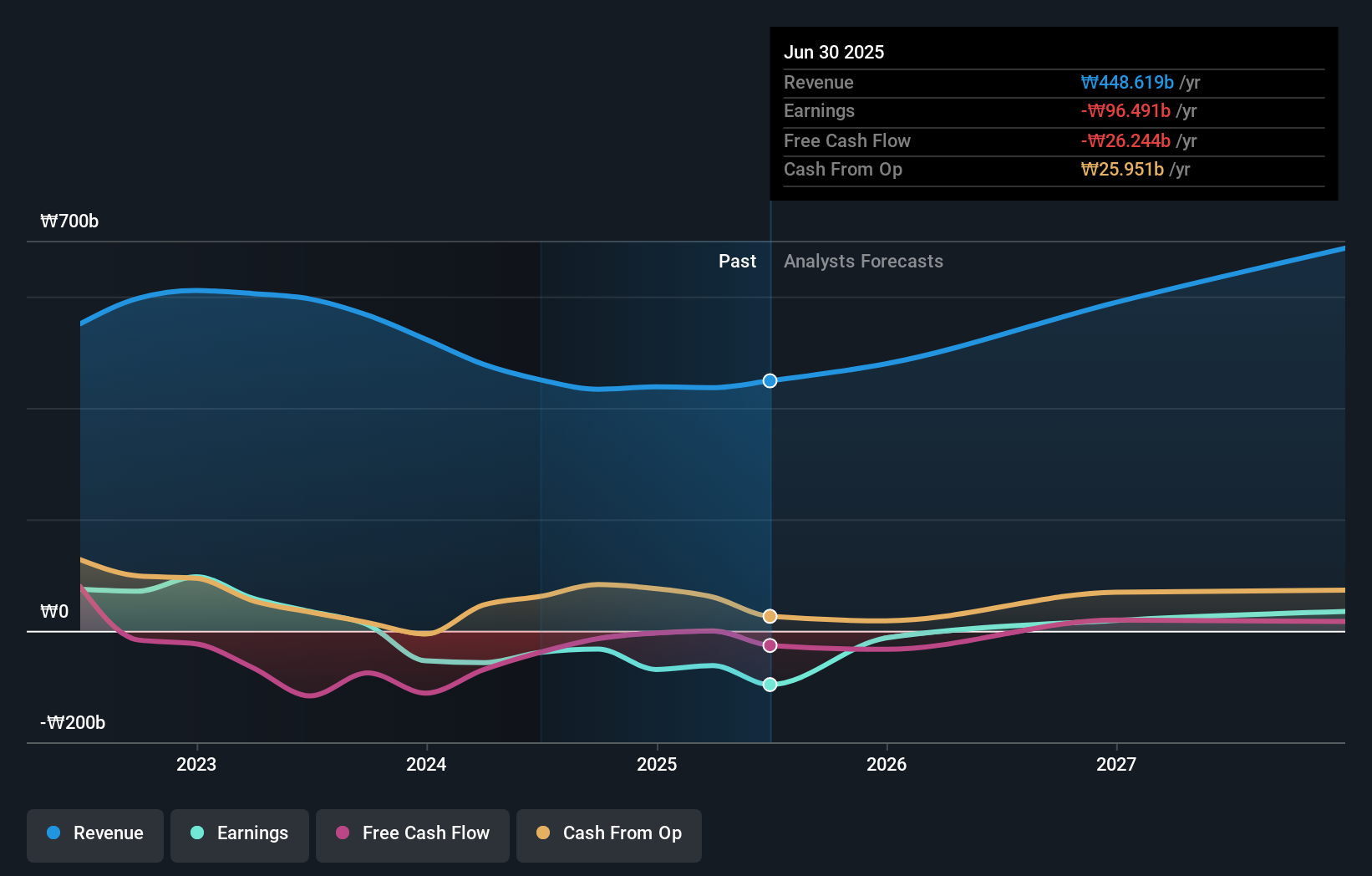- South Korea
- /
- Chemicals
- /
- KOSE:A093370
Individual investors who hold 47% of Foosung Co., Ltd. (KRX:093370) gained 23%, insiders profited as well
Key Insights
- The considerable ownership by individual investors in Foosung indicates that they collectively have a greater say in management and business strategy
- A total of 5 investors have a majority stake in the company with 50% ownership
- Insiders own 33% of Foosung
Every investor in Foosung Co., Ltd. (KRX:093370) should be aware of the most powerful shareholder groups. The group holding the most number of shares in the company, around 47% to be precise, is individual investors. In other words, the group stands to gain the most (or lose the most) from their investment into the company.
While individual investors were the group that reaped the most benefits after last week’s 23% price gain, insiders also received a 33% cut.
Let's take a closer look to see what the different types of shareholders can tell us about Foosung.
Check out our latest analysis for Foosung

What Does The Institutional Ownership Tell Us About Foosung?
Many institutions measure their performance against an index that approximates the local market. So they usually pay more attention to companies that are included in major indices.
As you can see, institutional investors have a fair amount of stake in Foosung. This suggests some credibility amongst professional investors. But we can't rely on that fact alone since institutions make bad investments sometimes, just like everyone does. When multiple institutions own a stock, there's always a risk that they are in a 'crowded trade'. When such a trade goes wrong, multiple parties may compete to sell stock fast. This risk is higher in a company without a history of growth. You can see Foosung's historic earnings and revenue below, but keep in mind there's always more to the story.

Hedge funds don't have many shares in Foosung. Looking at our data, we can see that the largest shareholder is the CEO Yong-Min Kim with 21% of shares outstanding. With 12% and 11% of the shares outstanding respectively, Keun-Soo Kim and Foosung HDS Co.,Ltd. are the second and third largest shareholders.
Our research also brought to light the fact that roughly 50% of the company is controlled by the top 5 shareholders suggesting that these owners wield significant influence on the business.
While it makes sense to study institutional ownership data for a company, it also makes sense to study analyst sentiments to know which way the wind is blowing. There is some analyst coverage of the stock, but it could still become more well known, with time.
Insider Ownership Of Foosung
The definition of an insider can differ slightly between different countries, but members of the board of directors always count. Management ultimately answers to the board. However, it is not uncommon for managers to be executive board members, especially if they are a founder or the CEO.
I generally consider insider ownership to be a good thing. However, on some occasions it makes it more difficult for other shareholders to hold the board accountable for decisions.
It seems insiders own a significant proportion of Foosung Co., Ltd.. It has a market capitalization of just ₩722b, and insiders have ₩237b worth of shares in their own names. This may suggest that the founders still own a lot of shares. You can click here to see if they have been buying or selling.
General Public Ownership
The general public, who are usually individual investors, hold a 47% stake in Foosung. This size of ownership, while considerable, may not be enough to change company policy if the decision is not in sync with other large shareholders.
Private Company Ownership
We can see that Private Companies own 12%, of the shares on issue. It might be worth looking deeper into this. If related parties, such as insiders, have an interest in one of these private companies, that should be disclosed in the annual report. Private companies may also have a strategic interest in the company.
Next Steps:
It's always worth thinking about the different groups who own shares in a company. But to understand Foosung better, we need to consider many other factors. For example, we've discovered 2 warning signs for Foosung (1 is potentially serious!) that you should be aware of before investing here.
If you are like me, you may want to think about whether this company will grow or shrink. Luckily, you can check this free report showing analyst forecasts for its future.
NB: Figures in this article are calculated using data from the last twelve months, which refer to the 12-month period ending on the last date of the month the financial statement is dated. This may not be consistent with full year annual report figures.
New: AI Stock Screener & Alerts
Our new AI Stock Screener scans the market every day to uncover opportunities.
• Dividend Powerhouses (3%+ Yield)
• Undervalued Small Caps with Insider Buying
• High growth Tech and AI Companies
Or build your own from over 50 metrics.
Have feedback on this article? Concerned about the content? Get in touch with us directly. Alternatively, email editorial-team (at) simplywallst.com.
This article by Simply Wall St is general in nature. We provide commentary based on historical data and analyst forecasts only using an unbiased methodology and our articles are not intended to be financial advice. It does not constitute a recommendation to buy or sell any stock, and does not take account of your objectives, or your financial situation. We aim to bring you long-term focused analysis driven by fundamental data. Note that our analysis may not factor in the latest price-sensitive company announcements or qualitative material. Simply Wall St has no position in any stocks mentioned.
About KOSE:A093370
Foosung
Engages in the manufacture and sale of chemical products for automotive, iron and steel, semiconductor, construction, and environmental industries in South Korea.
Reasonable growth potential with very low risk.
Market Insights
Community Narratives



